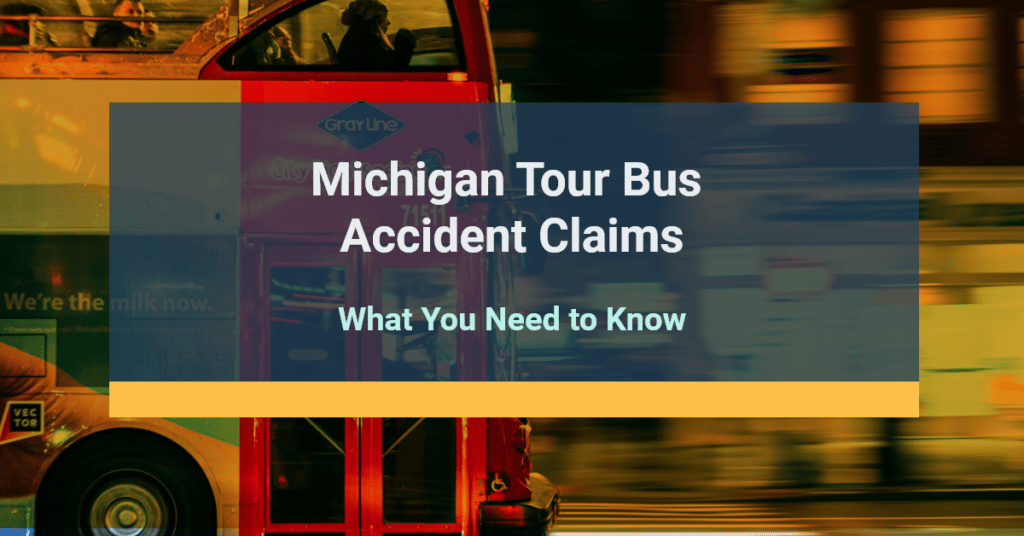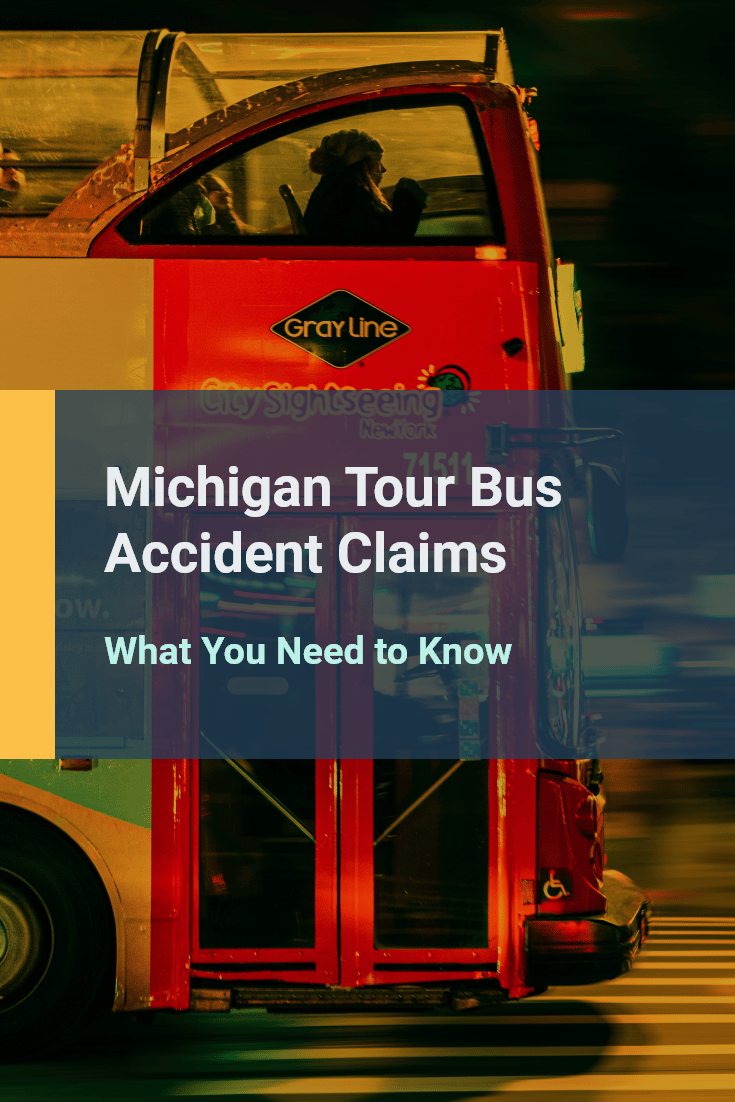Michigan Tour Bus Accident Claims Explained

There are three potential types of claims that you may have after a tour bus accident in Michigan. First, there is a case for No-Fault benefits to cover medical bills and lost wages if you cannot return to work. Second, there is a case for pain and suffering compensation. Third, there is a mini tort case for vehicle damages.
No-Fault benefits after a tour bus accident in Michigan
Here is what you need to know about making your case for No-Fault benefits after a tour bus accident in Michigan:
- No-Fault PIP benefits pay for your crash-related medical expenses, lost wages if your injuries have disabled you from working, reimbursement for mileage and transportation costs associated with traveling to and from your medical appointments, household replacement services and attendant care benefits.
- You must file an application for No-Fault benefits – which is also called your “written notice of injury” – with the responsible car insurance company within one (1) year after the crash. (MCL 500.3145(1) and (4)) If you fail to file your application on time – within ONE YEAR from the date of your crash – then you will forever lose any benefits to which you might be entitled.
- If the auto insurance company that is responsible for your No-Fault benefits refuses to pay, then your claim for unpaid, overdue No-Fault benefits must be reported against the insurance company within one year from the date that the medical bill, wage loss, medical mileage, replacement service or attendant service was incurred. (MCL 500.3145(2)) If such a claim is not filed within the one-year time period, then the bill will be time-barred and you will lose all rights to payment and/or reimbursement for the overdue benefits.
The No-Fault law’s “priority rules” determine what auto insurance company is responsible for paying your No-Fault benefits if you were injured in a tour bus accident in Michigan:
- If you are the driver of a car that was involved in the crash, then you will seek No-Fault benefits through your own auto insurance company. (MCL 500.3114(1))
- If you are the occupant of a car that was involved in the crash, then you will seek No-Fault benefits through your own auto insurance company or that of your spouse or a relative who lives in your home or through the Michigan Assigned Claims Plan, if no coverage is available through those other sources. (MCL 500.3114(1) and (4))
- If you are the driver of the bus that was involved in the crash, then you will seek No-Fault benefits from the insurer of the bus. (MCL 500.3114(2))
- If you are a passenger on the bus that was involved in a Michigan tour bus accident, then you will seek No-Fault benefits from the insurer of the bus only if you have no No-Fault coverage “under any other policy.” (MCL 500.3114(2)(a))
- If you are a pedestrian who was injured in the crash, then you will seek No-Fault benefits through your own auto insurance policy or through the policy of your spouse or a relative living in your home or from the Michigan Assigned Claims Plan. (MCL 500.3114(1); 500.3115)
- If you are a bicyclist who was injured in the crash, then you will seek No-Fault benefits through your own auto insurance policy or through the policy of your spouse or a relative living in your home or from the Michigan Assigned Claims Plan. (MCL 500.3114(1); 500.3115)
Pain and suffering compensation after a tour bus accident in Michigan
If you were injured in a tour bus accident in Michigan, you may have a case for pain and suffering compensation, which may include excess medical expenses that are not covered by the No-Fault medical coverage limit in the auto insurance policy that applies to your claim and excess lost wages.
Your case would be filed against the at-fault driver who caused the crash as well as the owner of that vehicle.
Who could be sued?
- The bus driver: Bus drivers have a duty to their passengers and other people on the road to drive safely. If the driver is negligent and does not keep the passengers safe, he or she can be liable.
- The bus company: The company that owns the bus can be responsible for the crash because it is the company’s job to make sure its employees are properly trained, that its buses are in good working order, and that its customers have safe experiences. If the entity that owned the bus failed to do anything that it was responsible for, then it can be held liable.
- The bus maintenance company or the bus/part manufacturer: If the bus company uses a maintenance service and that service was negligent in its maintenance or inspection, it can be held responsible. Similarly, if there was a defect in a part on the bus that caused the crash, the part manufacturer can be held liable.
- Negligent driver of another vehicle: The crash may have been caused by the negligent, at-fault driver of a secondary vehicle.
To succeed with a pain and suffering compensation case after a tour bus accident in Michigan, you must be able to show that you have suffered a “serious impairment of body function” or permanent, serious disfigurement.
The statute of limitations for filing a pain and suffering compensation case – as well as claims for excess medical expenses, excess lost wages and other economic loss – is three years after the date of the crash. (MCL 600.5805(2))
Causes of these types of crashes
The most common causes of these crashes include:
- Bus company negligence
- Bus driver negligence
- Bus driver fatigue
- Bus driver distracted driving
- Bus driver speeding
- Bus driver inattentiveness
- Bs driver driving under the influence of alcohol or drugs
- Bad weather
- Blind spots
- Left turns
- Negligence of at-fault drivers of other vehicles
- Bus fires
How texting and cell phone laws can prevent a tour bus accident in Michigan
The Michigan cell phone law can help prevent a tour bus accident from happening. The law prohibits a tour bus driver from texting while driving and from talking, dialing or answering a mobile phone while driving. (MCL 257.602b(2) and (3))
Research has shown that texting drivers are 23 times more likely to be involved in a motor vehicle crash and that dialing a hand-held cell phone while driving makes the driver 12 times more likely to crash.
The Michigan cell phone law’s prohibition on using a cell phone while driving only applies to bus drivers if the bus meets the definition of a “commercial motor vehicle.” (MCL 257.602b(3); 257.7a(1))
Mini tort case for vehicle damage after a tour bus accident in Michigan
If your car was damaged in a crash and the bus was at-fault, then you may be able file a mini tort claim against the bus driver and/or the bus’s owner.
Here is what you need to know:
- If the driver and/or bus owner refuses to pay your mini tort claim, you will have to file a lawsuit in small claims court.
- To succeed with collecting after you file your mini tort claim, you will need to show the bus driver was at-fault in causing the tour bus accident in Michigan, that your vehicle damages were not covered by insurance, the cost of your vehicle damage repairs (although the mini tort maximum recovery amount is $3,000)
It is important to talk with an experienced attorney before you sign any mini tort release from the bus owner or the bus’s insurer because these releases often contain language releasing the bus’s owner from liability for all claims arising out of the crash – not just for the vehicle damage to your car.
Need help? Call the attorneys at Michigan Auto Law
If you have been injured in a tour bus accident in Michigan and would like to speak with an experienced attorney, call us toll free anytime 24/7 for a free consultation with one of our attorneys. You can also get help from an experienced accident attorney by visiting our contact page or you can use the chat feature on our website.






